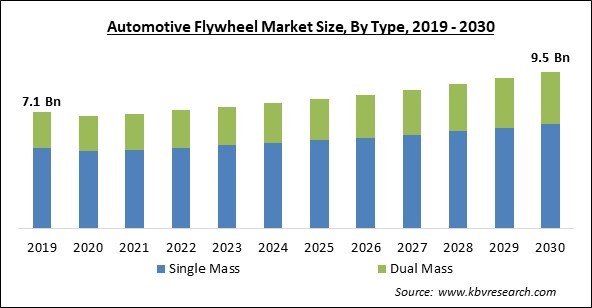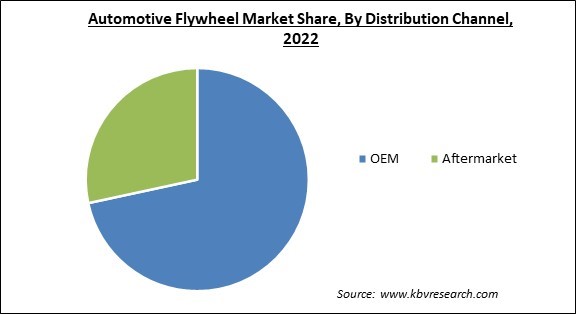The Global Automotive Flywheel Market size is expected to reach $9.5 billion by 2030, rising at a market growth of 3.7% CAGR during the forecast period.
Commercial vehicles utilization in developing nations has been fuelled by governmental laws that integrate substantial levels of safety and high requirements for local content. Thereby, Commercial vehicles generated 30% share of the market in 2022. The research and implementation of novel transportation vehicles have significantly increased in countries like the US, India, and China, which view vehicle manufacture and production as a basis of economic development. The OICA estimates that 23,418,078 commercial vehicles and 61,598,650 vehicles were produced globally in 2022. In addition, in 2022, the number of vehicles produced in India, China and the United States were 4,439,039 units, 23,836,083 units, and 1,751,736, respectively.
Additionally, the emergence of potential international automakers like General Motors, Hyundai, Kia, Renault, and Volvo, focusing on increasing their manufacturing capacities in emerging economies through joint ventures with local manufacturers, is predicted to contribute to the growth of the market. Some of the factors impacting the market are the increasing adoption of continuous variable transmission (CVT) and dual-clutch transmission (DCT), ongoing technological advancements, and less energy density and high cost of component.

Two types of transmission systems are employed in modern vehicles that are dual-clutch transmission (DCT) and continuously variable transmission (CVT). DCT, an automatic transmission has two clutches as opposed to one. When compared to the other clutch, the odd-numbered clutch controls additional gears. When a gear change is necessary, one clutch disengages as the other one engages, enabling smoother and quicker shifts. The automotive industry has witnessed constant developments in kinetic energy recovery systems in recent years, resulting in enhanced flywheel designs and materials. During the vehicle’s braking phase, the recovery of kinetic energy from an object in motion begins. Prominent market participants in the market may have many growth opportunities due to technological advancements in kinetic energy recovery technologies throughout the forecast period.
However, one of the most effective methods for storing energy is the flywheel energy storage system (FESS). FESS has a larger power output than batteries, measured in Watts (W), but it cannot keep as much energy, measured in Watt-Hours (Who), for an extended period. As a result, its adoption is expected to be lower when longer-term energy storage is needed. Additionally, these systems have significant capital costs because they need specialized components, like magnetic bearings, to operate at high speeds with a firmly balanced system that provides adequate mechanical performance. As a result, the system's capital expense rises even further.
Based on distribution channel, the market is segmented into OEM, and aftermarket. In 2022, the OEM segment held the highest revenue share in the market. The market will expand due to the growing demand for automatic transmission in automobiles. The dual mass flywheel regulator enables OEMs and users to have lower noise levels, easy gearshifts, longer service lives, lower fuel consumption, and improved vehicle performance. The other notable factors responsible for the growth in demand for the automotive flywheel in this segment are the strict government rules for noise management and emission within the vehicles.

By type, the market is classified into single mass and dual mass. In 2022, the single mass segment witnessed the largest revenue share in the market. This is because of its efficient heat dissipation capabilities and lack of intricate, wear-prone flywheel components; the SMF is incredibly durable. As the flywheel does not need to be replaced along with the other clutch components, the SMF is less expensive to construct and has the added benefit of lowering the cost of a subsequent replacement. Hence, the segment is expected to propel due to its high durability and cost-effectiveness.
On the basis of transmission type, the market is categorized into manual transmission, semi-automatic & automatic transmission, and continuously variable transmission. The semi-automatic & automatic transmission segment garnered a significant revenue share in the market in 2022. Semi-automatic transmissions are more affordable than automatic transmissions, hence their market is anticipated to expand quickly. Furthermore, semi-automatic transmissions are gaining popularity since they are easier to drive and consume less fuel than manual ones.
By vehicle type, the market is bifurcated into passenger vehicle and commercial vehicle. The commercial vehicle segment recorded a remarkable revenue share in the market in 2022. Flywheels serve various purposes in commercial vehicles. For instance, a vehicle's automotive flywheel enables a driver to shift gears swiftly and smoothly. In addition, it allows users to adjust gear speed according to road conditions. Furthermore, they are advantageous during braking as they contribute to the dissipation of kinetic energy from the drivetrain, which aids in the acceleration reduction of commercial vehicles.
| Report Attribute | Details |
|---|---|
| Market size value in 2022 | USD 7.2 Billion |
| Market size forecast in 2030 | USD 9.5 Billion |
| Base Year | 2022 |
| Historical Period | 2019 to 2021 |
| Forecast Period | 2023 to 2030 |
| Revenue Growth Rate | CAGR of 3.7% from 2023 to 2030 |
| Number of Pages | 226 |
| Number of Table | 410 |
| Report coverage | Market Trends, Revenue Estimation and Forecast, Segmentation Analysis, Regional and Country Breakdown, Companies Strategic Developments, Company Profiling |
| Segments covered | Type, Transmission Type, Distribution Channel, Vehicle Type, Region |
| Country scope | US, Canada, Mexico, Germany, UK, France, Russia, Spain, Italy, China, Japan, India, South Korea, Singapore, Malaysia, Brazil, Argentina, UAE, Saudi Arabia, South Africa, Nigeria |
| Growth Drivers |
|
| Restraints |
|
Region wise, the market is analysed across North America, Europe, Asia Pacific and LAMEA. In 2022, the Asia Pacific region led the market by generating the highest revenue share. This results from rising urbanization, an increase in two- & three-wheeled and passenger vehicles, the expansion of significant manufacturing industries in regions such as China, India, and Japan, and a rise in consumer purchasing power.
Free Valuable Insights: Global Automotive Flywheel Market size to reach USD 9.5 Billion by 2030
The market research report covers the analysis of key stake holders of the market. Key companies profiled in the report include Ford Motor Company, Schaeffler AG, Valeo SA, ZF Friedrichshafen AG, Aisin Corporation (Toyota Motor Corporation), EXEDY Globalparts Corporation (EXEDY Corporation), AMS Automotive LLC, Pioneer Automotive Industries LLC (Lodi Group), Skyway Precision, Inc. and SPEC Clutch, Inc.
By Type
By Transmission Type
By Distribution Channel
By Vehicle Type
By Geography
This Market size is expected to reach $9.5 billion by 2030.
Ongoing technological advancements are driving the Market in coming years, however, Less energy density and high cost of component hindering the market restraints the growth of the Market.
Ford Motor Company, Schaeffler AG, Valeo SA, ZF Friedrichshafen AG, Aisin Corporation (Toyota Motor Corporation), EXEDY Globalparts Corporation (EXEDY Corporation), AMS Automotive LLC, Pioneer Automotive Industries LLC (Lodi Group), Skyway Precision, Inc. and SPEC Clutch, Inc.
The Passenger Vehicle segment is generating the highest revenue share in the Market by Vehicle Type in 2022 thereby, achieving a market value of $6.5 billion by 2030.
The Manual Transmission segment is leading the Global Automotive Flywheel Market by Transmission Type in 2022 thereby, achieving a market value of $4.7 billion by 2030.
The Asia Pacific market dominated the Global Automotive Flywheel Market by Region in 2022, and would continue to be a dominant market till 2030; thereby, achieving a market value of $3.7 billion by 2030.
Our team of dedicated experts can provide you with attractive expansion opportunities for your business.

